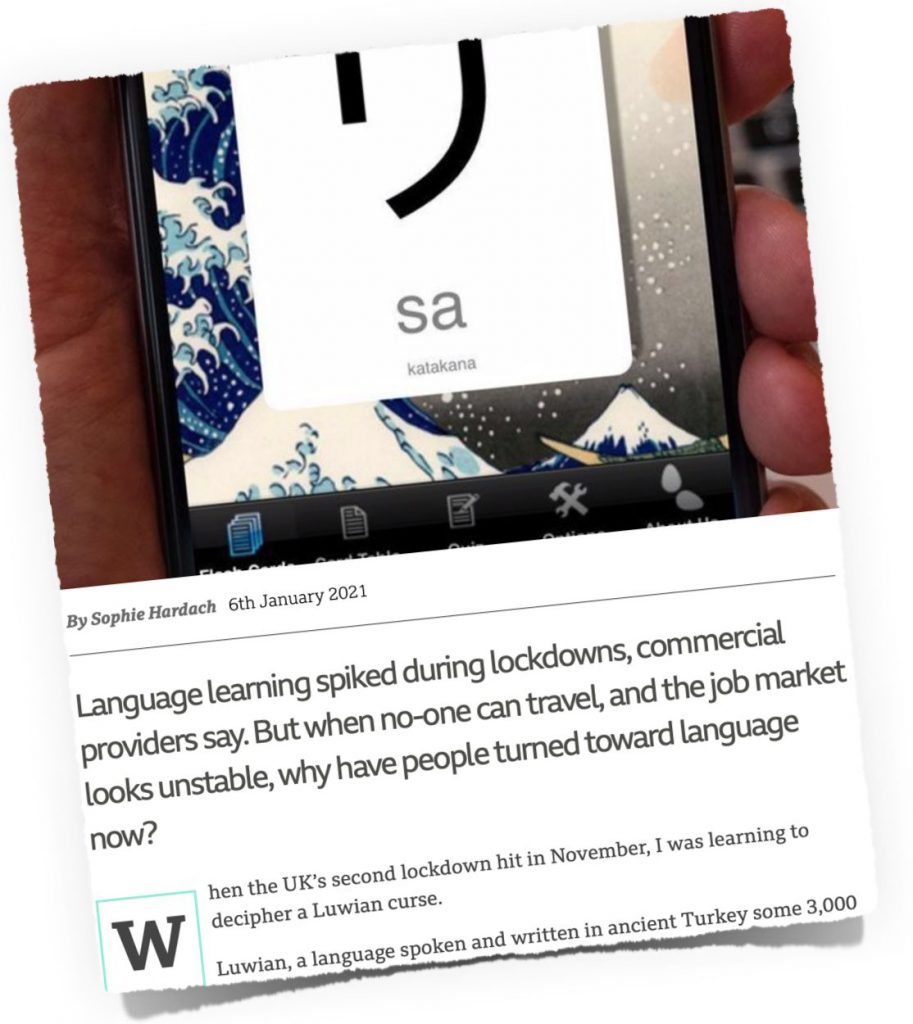
Optimists live longer, earn more and students who have optimistic teachers learn more.
So in that spirit, over the past year I’ve been sharing stories in the Genki Business group of industries that have been booming during the pandemic.
It certainly isn’t all doom and gloom.
From breakfast cereals to pet food, from yarn spinning to electric guitars, many industries have had, and continue to have, their best year ever.
The question always was “well, where are the news stories about language learning, surely that can’t be booming too?” Well, here it is, from the bbc about how language learning is indeed booming during the pandemic.
So how can that help you?
Well, let’s look at a couple of trends ….
First of all it’s language learning, not teaching. People aren’t wanting lessons, they are wanting to learn the language. Make sure you are on the right side of that.
And let’s also look at *how* people are learning.
It’s all apps and online videos.
The idea of getting a human language teacher is seen as quaint and old fashioned for many people these days. Like using a VHS tape or posting a letter, it’s something they’ve heard of and sounds cute but they’d never even consider to actually learn with.
So how can you flip that to your advantage? Or maybe you don’t and believe that Kodak and flip phones still rule the world?
Or, If you get that apps can provide unlimited listening, cute graphics and 24/7 availability, how can you satisfy your students needs and desires in a way that only a human teacher can?
What can you do that is better and different?
And let’s look at why people learning languages.
It’s not for business or exams.
The boom is happening because of how it makes people feel.
It’s fun. It’s a mental challenge. It’s to de-stress. It’s to feel connected with the world. It’s to have a sense of travel and adventure when we can’t move out of our homes.
It’s because people have time and are addressing their priorities of things they’ve always wanted to do or feeling guilty about not doing.
So, as someone uniquely situated to help these people with their learning, how can you address all those needs with your lessons and more importantly with your marketing?
Are you selling “lessons” or “English” or are you selling a time honored way to relax, have fun, destress, whilst learning an enjoyable skill you know you’ve always wanted to learn that brings you more connection to the world and a true sense of excitement, adventure, travel and community even if you are locked up at home?
Some industries are indeed dead or dying. Think business travel or hotels. However many industries are in a k shape with many people going down and many rising higher than ever before as people really feel a desperate need for their services.
So how can you, and we, make sure that you are on the upward slope of that k shape?



Love your optimistic take on this and on life in general! It’s totally the « go get it » attitude rather than lamenting on our destiny that will uktimately show who is fit for survival. Keep up your inspiring and encouraging work Richard!
I think teachers can embrace the apps and make them part of their program.
Yes, there are a lot of apps but most of them aren’t much good. Students, and parents in particular don’t know how to find the good ones. Then even when people start using apps they won’t usually stick at it without the drive of a teacher or a group of classmates. The best app I know of is Flipgrid, but it’s not for self study.
Soon most kids, well in Japan at least, will have a tablet. So teachers can incorporate good apps. into their program for their whole class to use. A teacher can now easily setup an extensive reading program using an app for example, whereas before the teacher would need a whole library of books and a library system to do extensive reading.
@Astrid: Thank you! 🙂
@Trevor: I think actually the data has changed this year in that many kids are actually getting really great results from the tech. Maybe not apps as such but mainly through games/media in the target language!
My kids play Minecraft, Lego City etc.. in English and they watch Disney+ and Netflix in English too. But I imagine this is extremely rare in Japan (for young learners). Is there data showing that Japanese kids are consuming English media and games?
Hi Trevor,
Yep, outside of anecdotal evidence in bilingual mums groups, it is rare as usual in Japan due to the lack of incentives! 🙂